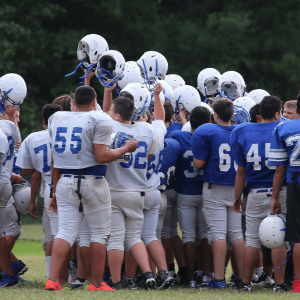
by Steve Stark | Oct 10, 2016 | coaching kids, player development
Teaching kids leadership is often a topic we don’t spend enough time on as parents and coaches.
The ability to lead is a skill that found in almost every successful athlete.
There are many ways to be a leader.
Some leaders are quiet, some are loud and others lead without a sound.
In any case there are things we can do as parents and coaches that will help with teaching kids leadership.
5 Ways of Teaching Kids Leadership
1. Develop problem-solving skills.
Adversity happens to us all.
How we deal with adversity often determines our level of success.
We need to teach our kids that problems are a normal part of life but there are always solutions.
When faced with problems, kids need to keep calm, assess the problem, and create a plan to find a solution.
These are things we can practice at home with homework, chores, and even at play.
I remember when I was a kid we used to play wiffleball for hours.
The problem we often had was a broken or lost wiffleball.
So we came up with a new game. We used paper towel, scrunched it up and covered it with electrical tape.
We then used a tennis racket for a bat and voila! Tape ball was born.
Great game for a bunch of 8 year olds. (and the ball sent a mile off the tennis racket which caused us other problems. Like finding a bigger field without windows.)
2. Teach decision-making skills.
Good leaders make good decisions.
Great leaders make the same decisions faster and under pressure.
 The decisions we make define our lives.
The decisions we make define our lives.
It’s no different on a field in a game.
We can easily help teach this in our homes.
How many decisions do you make for your children that they could be making themselves on a daily basis?
What to wear?
What to eat?
How to spend their money?
These are very basic decisions but your kids need to take ownership of them.
There are consequences, both good and bad, for the decisions we make.
Don’t shield your child by making all their decisions for them. Let them learn through making decisions.
Even if some are wrong.
Both problem-solving and decision-making are critical to developing self-esteem and self-confidence.
These are skills that will serve them every day of their lives in any environment.
3. Emphasize the importance of communication.
Leaders have to be good communicators.
This doesn’t mean that a leader has to be vocal in a rah-rah kind of way.
It means they have to able to talk to coaches and teammates.
They need to be able to lift up their teammates when needed.
Leaders have to communicate with coaches to help coaches understand the mood and pulse of the team.
They need to be an example to others and show how to interact properly on a team.
We can help our athletes by encouraging them to talk to us about their day.
Start a discussion at home.
To many times, as parents, we just react to things instead of starting a meaningful conversation.
Be a good listener and your child will learn that aspect of communication as well.
4. Encourage more team activities.
Every opportunity to compete on a team is a chance to hone your skills as a teammate and a leader.
Learning to compete, lead and succeed in a team environment is invaluable.
These are lessons that will carry forward into their classroom, their home and someday their career.
There are a ton of opportunities for team activities in sports and out.
Clubs at school, church or in the community all offer the chance to participate in team activities.
Help you child take advantage of as many of these opportunities as possible.
5. Practice positivity.
Belief in yourself is the first ingredient to leadership.
A belief in your team comes in a close second.
Staying positive, even in the face of adversity, will define you as a leader.
If you hang your head as a leader, what do you think your teammates will do?
You have to stay positive and you have to believe it.
Someone is always watching so you have to be genuine with your positivity.
Just the rah-rah stuff won’t get it done.
To be a great leader your positivity has to be felt not just heard.
As parents and coaches we can teach this by being the example.
Practice positivity at home and it becomes a pillar of teaching kids leadership.
If you you found value with today’s post please like, comment and share.
Play Big!

Coach Steve

by Steve Stark | Oct 3, 2016 | coaching kids, player development
Sportsmanship in football is all about respect.
Players have to have respect for their teammates, coaches, officials, and opponents.
As we have said many times, football is a very emotional sport.
It can be difficult for players to keep their composure and make good decisions.
This past weekend I watched #3 Louisville vs. #5 Clemson.
It was a great game.
There was one play however that really disturbed me.
Clemson linebacker Ben Boulware tackled Louisville quarterback Lamar Jackson.
Boulware, after Jackson is down and in the pile, has Jackson around the neck and continues to crank hard on his neck.
Check out the video below and comment about what you see.
[video_player type=”embed” width=”560″ height=”315″ align=”center” margin_top=”0″ margin_bottom=”20″] [/video_player]
[/video_player]
It was dirty and there is no place in football for this kind of play.
In today’s video I discuss a few ways coaches and parents can help build sportsmanship in football.
[video_player type=”embed” width=”560″ height=”315″ align=”center” margin_top=”0″ margin_bottom=”20″] [/video_player]
[/video_player]
[hyperlink style=”1″ href=”http%3A%2F%2Ftrenchtraining.com%2Ffree” font_size=”20″ font_style=”bold” font_color=”%23d11515″ align=”center”]Click Here to Become a BIG PLAYER with our FREE TrenchTraining.com Membership![/hyperlink]
Building Sportsmanship in Football
Give constant reminders of what is acceptable behavior.
As parents, we do this at home all the time.
What’s amazing to me is how some parents forget this when their kids play sports.
“It’s just part of the game.” “It was in the heat of the moment.” “He’s just being aggressive.”
Really?
It’s not difficult to see right from wrong on a field or a court.
I actually know parents who take joy in seeing their kids be bullies on the field.
It’s not hard to see where these kids get this behavior.
Coaches and parents need to make behavior the highest priority in youth football.
This behavior carries over.
Kids who act poorly on the field often do so in the classroom and other social interactions.
Respect is a lesson we can teach every day in football.
It will carry over to every part of an athlete’s life.
Be a positive example of sportsmanship.
Kids learn from the adults in their lives.
Parents, coaches and other mentors influence a child’s behavior more than anything else.
That includes their peers.
Our kids want approval from their parents and coaches.
They want to make us happy.
Be sure that you give them the right example of how to behave both on and off the field.
Emphasize fun over winning.
At the youth level, everything we do should be about making sure the kids are enjoying the game.
We lose too many kids that we don’t help have fun with football.
Sportsmanship plays a huge role in keeping kids playing the sport.
We need to spend time and effort teaching our kids fundamentals of the game and making it fun.
That means letting kids play.
If the same 11 kids play every game, only those 11 can improve.
It takes more than 11 players to win games.
It takes more than 22 players to win.
It takes a team and in order to keep kids around and playing we have to make it fun.
Can you be aggressive and display sportsmanship in football?
Absolutely!
You can be aggressive and still display sportsmanship in football.
When I stepped onto a football field I wanted to destroy the team I was playing against.
But I still always had respect for my opponent.
There is no better feeling as an offensive linemen than driving a defender 10 yards off the ball and planting them on their back.
There is nothing more demoralizing for your opponent than getting up after that block and helping them back to their feet.
However, this is where so many players struggle.
“Act like you’ve been there before.”
If a player makes a great play it’s okay to celebrate.
Too many young players like to posture and taunt.
There’s nothing wrong with celebrating but players can do it without showing up their opponent.
Start with respect and display good sportsmanship.
If you you found value with today’s post please like, comment and share.
Play Big!

Coach Steve

by Steve Stark | Sep 26, 2016 | coaching kids, player development
Recently, a mother of a player asked me about playing time.
Her son plays Sophomore (JV), is playing both ways, and is doing very well.
He was asked to dress for the varsity game on Friday night and he did.
The varsity team was winning by a lot and the coach put in all the players with the exception of him.
Both mom and player were frustrated that he did not get in.
So she wanted my opinion on the situation.
For me, there are a lot of things that I have learned in regards to playing time and coaches.
One of the biggest messages that I can give now that I have spent so much time learning how to coach others is that the ONLY PERSON you can control is yourself.
We as a society have gotten really good at blaming and questioning others because of social media, all the football commentary that is on tv these days and just the massive amounts of information that is out there for the general public to find.
Many feel that they know more than coaches.
Coaches have many reasons for how they decide on playing time.
One of the things that could have happened is that there were Juniors or Seniors that they had to play because they don’t have the opportunity on the Sophomore team.
This is just one reason that I came up with but there are many others.
Help your athletes learn to be grateful for the things that they have.
I am sure many other sophomores would have loved to just be able to put on a jersey and stand on the sidelines with all the fans there.
Finding an attitude of gratitude changes players very quickly and puts things in perspective.
It is incredibly tough to be a coach these days.
One reason is the amount of criticism that is placed on you by parents and players.
So with that said, I had given the advice that the best thing that a player can do when he does not reach the goal of getting the type of playing time he thinks he deserves is to place the frustration and anger on his own shoulders and use it as a chip to practice and play harder.
Again the only person that you can control is yourself.
In football, injuries, bad play, etc., happen all the time and players get replaced by others that sit in the weeds and work their ass off.
Tom Emma wrote an article that said a lot of what I agree with.
Even though it is about basketball, it holds true for all sports.
I encourage you to go to the link below and read the article. I am going to use his 8 suggestions and put my spin to each one.
But I encourage you to read his spin on it as well.
“Fortunately there are some proven strategies you can implement that will help you deal with the challenges and strong emotions that accompany not playing as much as you would like.” Excerpt from Thomas Emma http://www.coachesclipboard.net/LackPlayingTime.html
Tom had these 8 suggestions that he wrote about in the article listed above. I am responding to each with my own view point.
8 Strategies to Deal with a Lack of Playing Time
1. Ask Coach
Ask the coach what you can do better.
Don’t even mention playing or lack of playing time.
Make the focus on what it is that the coach would like you to do better and then that will give you something to really focus on in practice.
2. Keep Working
In life it is a proven fact that those that work harder are more successful than those that do not.
There are only a handful of athletes that are able to work to the highest extent of their ability.
All the rest of us have to continue to work harder.
This also includes working smarter.
The best way to work smarter is to listen to the coaches even if you disagree with them and to work towards the coaches method to the best of your ability.
Show the coach you care about what he or she has to say and work harder today than you did yesterday!
3. Always Remain Engaged and Ready Emotionally
This takes a lot of work not only on the practice field but also out of practice.
Study the plays, envision what the perfect plays look like, watch film, read material on how other athletes handle frustration, adversity and struggles of the game you play.
4. Keep it Quiet
Talk to your parents or a mentor that will keep it quiet.
The one thing that I have seen ruin morale on teams is players who complain and talk bad about others, including coaches.
The best thing you can do is to be a great teammate and support others including coaches.
Talk positively and strongly about the members on your team at all times. complaining is the biggest cancer that can happen to a team.
I know I had many complaints over the years I played.
I regret how I handled some of those instances because I can now see that it hurt my game when I was in the complaining mode.
5. Commit to Traversing the Razor’s Edge of Being a Good Teammate
I mentioned some of this above and that is to be a great teammate.
Don’t just be a good teammate, rise up to being a great teammate!
6. Always Maintain Your Passion for the Game
When you are on a losing team or you are not playing much this is a very difficult task.
This is where it is imperative to really dig deep into your core and find the passion for the love of the game.
Even on losing teams or not having playing time you can find games that you can be fully proud of the way you played and had fun.
You can also get a lot of enjoyment from practice if you turn the practice into a competition.
Finding competition is where I believe the fun comes from. Compete, compete, compete!!!
7. Help Your Direct Competition as Best You Can
Learning from and teaching others is a great asset to any team.
I get frustrated when I see a player who sulks or sits away from a team when they are either benched or they don’t get time in the game.
I have seen many players who have had that happen and they had a great attitude and helped others.
They kept their head in the game and improved their play from the sidelines in practice and as soon as the player ahead of them either gets hurt or their play decreases they come in and shine.
It is a long season.
Work hard and realize that you need to maximize every opportunity you get.
8. Take This Opportunity to Release From Self Absorption
Team sports are about the team.
Even gymnasts, swimmers and single sport athletes have a team of trainers and coaches and people supporting them.
Learning to be selfless and play for the greater good is a skill that will help you in your careers as well as your relationships that you have for the remainder of your life.
So use playing time as a chip on your shoulder to help you get more playing time as well as keep your playing time.
Football, and life for that matter, can change on a dime and you can be thrown curve balls, adversity and tragedy at any time.
Those players that learn how to handle these situations are the ones that become very successful people in life.
Use the game of football as a way to learn how to live life.
If you find yourself wanting more playing time, do yourself and your team a favor and Play Big using the techniques listed above.
Have a great day and remember to always “Play Big”

Coach Glenn

by Steve Stark | Sep 19, 2016 | coaching kids, player development
Saying motivated during a football season can be difficult.
When you reach that 4th or 5th week of the season in high school, practice is a grind.
Add a tough loss to the mix and it can be downright brutal.
Staying motivated to improve and preparing to win is essential.
In today’s video we discuss a few ways of staying motivated during the grind.
[video_player type=”embed” width=”640″ height=”360″ align=”center” margin_top=”0″ margin_bottom=”20″] [/video_player]
[/video_player]
[hyperlink style=”1″ href=”http%3A%2F%2Ftrenchtraining.com%2Ffree” font_size=”20″ font_style=”bold” font_color=”%23d11515″ align=”center”]Click Here to Become a BIG PLAYER with our FREE TrenchTraining.com Membership![/hyperlink]
4 Ways of Staying Motivated
Take care of your body.
As the football season progresses, players’ bodies take a beating.
When your body isn’t right, it plays on your mind.
Be sure to take care of any injuries and sore muscles.
If you regularly ice and treat your aches and pains practices and games won’t be as much of a grind.
Take a break.
Find a day to get away from football.
Good coaches know when their team needs a break.
Players need to know when to take a break too.
During the season this is tough.
If you get a day off take advantage and do something to relax.
Just the mental break from thinking about football can have a huge impact on staying motivated during your season.
Pick each other up.
The best motivation comes from the guys you spend time with in the trenches.
Be a great teammate.
When you see someone who is struggling mid-season, pick them up.
We all want to manly and tough football players.
That doesn’t mean we don’t need help sometimes.
The mental part of the game is just as important as the physical.
Nothing helps you stay motivated more than having great teammates.
Remember to have fun.
Playing football is fun.
Being on a football team is fun.
Sometimes we get so caught up in preparing to win that we forget we need to have fun.
Coaches need to realize this more than anyone.
As a coach, I know I have been guilty of sucking the fun out of a practice.
It’s a delicate balance but we need to have fun everyday.
If not, a team just won’t reach it’s potential.
So have fun!
If you you found value with today’s post please like, comment and share.
Play Big!

Coach Steve

by Steve Stark | Sep 12, 2016 | coaching kids
Dealing with temptation is a test of a person’s ability to choose good instead of evil.
If you play sports then the goal is always to win and become the best player you can be, right?
Otherwise why play this difficult game?
I know temptation all too well and have dealt with it my entire life as you all will as well.
Temptation is something that can take us from our goal.
I am going to explain how temptation took over at times in my life.
There are ways to help keep temptations to a minimum that will help you to reach your goals.
In today’s video I discuss a few ways of dealing with temptation.
[video_player type=”embed” width=”560″ height=”315″ align=”center” margin_top=”0″ margin_bottom=”20″] [/video_player]
[/video_player]
[hyperlink style=”1″ href=”http%3A%2F%2Ftrenchtraining.com%2Ffree” font_size=”20″ font_style=”bold” font_color=”%23d11515″ align=”center”]Click Here to Become a BIG PLAYER with our FREE TrenchTraining.com Membership![/hyperlink]
4 Ways of Dealing with Temptation
1. Have solid goals
Set goals and track your progress as you work towards achieving them.
The temptations that I had when I was a young football player were distractions that kept me from some of my goals.
But part of the problem was that I did not have very well defined goals.
It could have been because of this lack of defined goals that temptation was such a problem for me.
It would be very easy for me to blame my parents and others.
However, the fact is they were doing the best that they could at the time and I was the one that kept choosing not to be focused on any goals.
So with that said it is very important that you get as concise and detailed goals as you can.
It’s important to realize that goals are one way to help you keep the temptations at a minimum.
Make yourself accountable by setting your goals publicly.
Motivate others through detailing your progress and interact with like-minded individuals who are are on a similar path.
2. Surround yourself with like minded people
Find people that want to succeed the same as you.
As I mention in the video, we can choose to become like-minded with losers just as well as we can become like-minded with winners.
We get to choose who we feel is a loser and who is a winner based on the goals that they each have set.
3. Get Help
There are mentors, coaches, teachers, pastors, uncles, aunts, and many others that understand how much temptation can move you away from your goals.
They understand because they have had to deal with temptation too.
There is NO shame in asking for help.
But the shame does come when you ask for help and then choose not to accept or refuse to learn from the help you get.
Many people ask for help and then refuse to use it.
This is something to watch for because the temptations you are facing are what is swaying you from taking the help.
When we ask for help it does not mean we need to fully accept the help we get and buy into it 100% because every one of us is different in what our experiences have been.
What I suggest is that you ask for help, listen to the help, and figure a way to absorb it by writing it down.
Some help I have gotten I have thrown in the garbage right away.
Unfortunately, down the road I have realized that I should have kept it and used it.
At the time, I just couldn’t understand it.
So don’t just give up on the help immediately but put it somewhere so that you can think about it and use it when you’re ready.
4. Realize your football career is short
This is a tough one for all football players and other sport athletes as well.
Many athletic careers are over once they are done with high school.
Those that are able to go on and play in college add only 4 to 5 years to their career and those that make it to the NFL rarely add on 3 more years.
So in a normal life span of 70+ years, most football players play about 6 years of football.
This is such a short time in a person’s life.
If you were to ask most players what football meant to them you would hear that it was 6 years that changed their lives.
Because players have such a limited window for a career, it’s important for to realize how temptation can and will mess with their goals.
I have listed some of the temptations that were large in my life when I was a young football player.
- The couch
- Desserts
- Friends that did not have my back
- Girls
- Drugs and Alcohol
- Goofing around in class and not taking school seriously
- TV “now video games are big ones”
- NOT Going to bed on time
- Staying out late with my friends
- To not be honest about what I was really thinking and wanting to do
These are a few but they are the ones that seemed to haunt me the most.
Not all of them are “bad” or “Evil” as you can probably see but they are temptations that kept me from my goals.
Temptations are something that you can no completely eliminate!
What is important is to understand the temptations in your life and how they are affecting your goals.
Again football is a difficult sport.
It takes a lot of hard work and discipline if you want to be really good
These are some suggestions to help you all in your quest to “Play Big”… if that is your goal.
Coming very soon we will be adding more in-depth articles in our membership site. Please get your membership now so you can get access.
Have a great day and remember to always “Play Big”

Coach Glenn

by Steve Stark | Sep 5, 2016 | coaching kids, youth football
Dealing with a loss in football is never easy.
Let’s just say it… losing SUCKS!
Everyone will deal with a loss in football.
I can guarantee you will not go undefeated your entire career.
We all experience difficult losses in football and in life.
How we handle those losses and what we learn form those losses makes us who we are.
In today’s video I discuss some ways to turn a loss into you most valuable learning experiences.
[video_player type=”embed” width=”560″ height=”315″ align=”center” margin_top=”0″ margin_bottom=”20″] [/video_player]
[/video_player]
[hyperlink style=”1″ href=”http%3A%2F%2Ftrenchtraining.com%2Ffree” font_size=”20″ font_style=”bold” font_color=”%23d11515″ align=”center”]Click Here to Become a BIG PLAYER with our FREE TrenchTraining.com Membership![/hyperlink]
Lessons from Dealing with a Loss
Dealing with a loss reveals your character.
Compared to dealing with a loss, winning is easy.
Although, winning has it’s difficult moments as well.
Both will reveal the character of a player… but a loss, even more so.
Football is an emotional game.
Players will face adversity in every game they play.
How you deal with that adversity defines a player.
I had a chance to watch my Wisconsin Badgers beat LSU this past weekend and it was awesome.
… if you are Badger fan.
Many people are still talking about a cheap shot that an LSU linemen gave a badger player at the end of the game.
[video_player type=”embed” width=”560″ height=”315″ align=”center” margin_top=”0″ margin_bottom=”20″] [/video_player]
[/video_player]
That’s what losing can do to some players.
Emotions and frustration run high.
A young man makes a mistake and not only did he lose a game but now he has to face a suspension.
That’s a difficult lesson but one that I hope he learns.
Keep emotions in check.
As I said above, football is a very emotional sport.
Keeping an even head can be tough.
Players never want to get too high with a win or too low with a loss.
If you play sports you have to have a short memory.
That doesn’t mean a player can’t celebrate a win or be upset about a loss.
But players have to move on quickly especially when you have a game next week.
What kind of a teammate are you?
NEVER play the blame game on a football team.
We win together and we lose together.
No one player is solely responsible for a win or a loss.
That’s the great thing about football. It is the ultimate team sport.
When players start pointing fingers at others after a loss, the team suffers.
That kind of behavior is toxic on a football team and will ensure that team is not successful.
Instead players need to pick each other up.
Have an appreciation for what your teammates do.
Realize that everyone’s job is important and EVERYONE will make mistakes.
Be a good teammate and be a leader.
Realize why you lost.
Why did you lose?
Was the other team more talented?
Did they execute better than you?
Was it a lack of effort from your team?
You need to understand why you lost in order to learn and get better.
Focus on the things that YOU can control.
How can you improve from week to week?
Someone has to win and someone has to lose.
Losses teach us much more than wins.
If you make dealing with a loss a strength those losses can help build championships.
Always be learning and always continue to get better.
I hope you found value with these tips on dealing with a loss.
If you did please like, comment and share.
Play Big!

Coach Steve

 The decisions we make define our lives.
The decisions we make define our lives.











